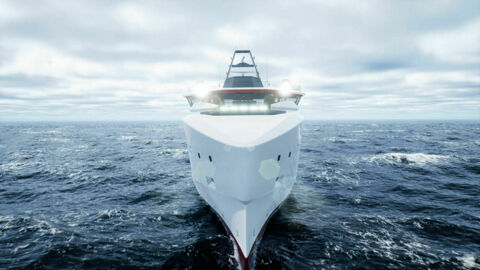Optimized for zero
Designing for zero is a race for energy conservation and operational performance. Today you can fill a conventional vessel with enough fuel oil to last for months, but alternative zero fuels all have significantly lower energy density. This means we have to design ships to do more with less.
10. December 2021

Optimizing energy use
Operating zero emission ships focuses on optimizing energy use across all onboard systems, as well as designing the most efficient hull that is fit for purpose. The upside for customers is that radically improved efficiency also means reduced running costs.
Big data revolution
Ship design has evolved rapidly over the past years, and many shipowners have not ordered newbuilds for quite some time. VARD has continuously worked to enhance the conceptual design and engineering processes and focused on how to optimize energy use and performance through leveraging of big data. By incorporating operational data from similar ships in conjunction with historical weather data our concept designers can optimize hull geometry and power arrangement.
Our hulls have always been adapted to the wave conditions the ship is expected to meet in operation. A major new development is that we now can perform systematic testing using validated CFD tools. Our tools and methods are now so efficient that we can evaluate more hull shapes, over a wide spectra of wave conditions, for a fraction of the cost and time. Enabling us to tailor the bow shape each design to the weather conditions and operating profile.

Speed, draught and waves are most important for hull shape, while optimizing the hull for lowest fuel consumption is finding the right compromise between general arrangement, resistance and stability. Since we have a parametric ship model we can investigate design variations and trade-offs while rapidly evaluating the consequences on fuel consumption for all the key operational parameters throughout the design process
– Kåre Nerland, Principal Naval Architect Hydrodynamics
Digital experimentation
With the use of new technology and software, we can generate even more accurate calculations of fuel consumption for thousands of different hull shapes and fuel/battery system models. Virtual testing enables us to optimize the hull geometry and see how design modifications will affect the power setup before physical model testing is done as insurance to validate our calculations.
Finding your Zero
The hardest decision in designing a zero-emission ship is which energy carrier to use. All the zero and low-carbon alternatives have their pros and cons, with many factors still unknown. VARD’s validated design process analyzes all the baselines to identify the optimal fuel for each use case. Our design is developed to work with all potential zero fuels, providing maximal flexibility for the customer.

